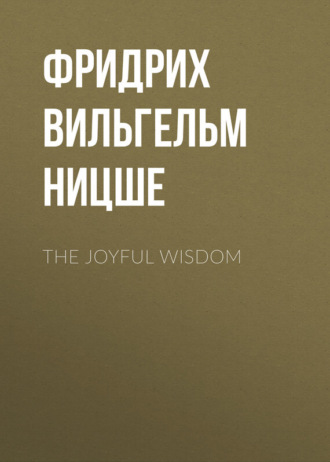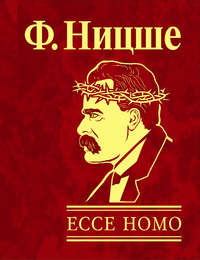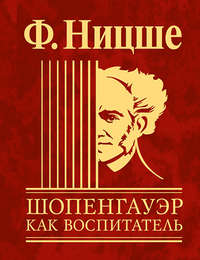 полная версия
полная версияThe Joyful Wisdom
The Origin of the Learned once more.– To seek self-preservation merely, is the expression of a state of distress, or of limitation of the true, fundamental instinct of life, which aims at the extension of power, and with this in view often enough calls in question self-preservation and sacrifices it. It should be taken as symptomatic when individual philosophers, as for example, the consumptive Spinoza, have seen and have been obliged to see the principal feature of life precisely in the so-called self-preservative instinct: – they have just been men in states of distress. That our modern natural sciences have entangled themselves so much with Spinoza's dogma (finally and most grossly in Darwinism, with its inconceivably one-sided doctrine of the "struggle for existence" – ), is probably owing to the origin of most of the inquirers into nature: they belong in this respect to the people, their forefathers have been poor and humble persons, who knew too well by immediate experience the difficulty of making a living. Over the whole of English Darwinism there hovers something of the suffocating air of over-crowded England, something of the odour of humble people in need and in straits. But as an investigator of nature, a person ought to emerge from his paltry human nook: and in nature the state of distress does not prevail, but superfluity, even prodigality to the extent of folly. The struggle for existence is only an exception, a temporary restriction of the will to live; the struggle, be it great or small, turns everywhere on predominance, on increase and expansion, on power, in conformity to the will to power, which is just the will to live.
350In Honour of Homines Religiosi.– The struggle against the church is certainly (among other things – for it has a manifold significance) the struggle of the more ordinary, cheerful, confiding, superficial natures against the rule of the graver, profounder, more contemplative natures, that is to say, the more malign and suspicious men, who with long continued distrust in the worth of life, brood also over their own worth: – the ordinary instinct of the people, its sensual gaiety, its "good heart," revolts against them. The entire Roman Church rests on a Southern suspicion of the nature of man (always misunderstood in the North), a suspicion whereby the European South has succeeded, to the inheritance of the profound Orient – the mysterious, venerable Asia – and its contemplative spirit. Protestantism was a popular insurrection in favour of the simple, the respectable, the superficial (the North has always been more good-natured and more shallow than the South), but it was the French Revolution that first gave the sceptre wholly and solemnly into the hands of the "good man" (the sheep, the ass, the goose, and everything incurably shallow, bawling, and fit for the Bedlam of "modern ideas").
351In Honour of Priestly Natures.– I think that philosophers have always felt themselves very remote from that which the people (in all classes of society nowadays) take for wisdom: the prudent, bovine placidity, piety, and country-parson meekness, which lies in the meadow and gazes at life seriously and ruminatingly: – this is probably because philosophers have not had sufficiently the taste of the "people," or of the country-parson, for that kind of wisdom. Philosophers will also perhaps be the last to acknowledge that the people should understand something of that which lies furthest from them, something of the great passion of the thinker, who lives and must live continually in the storm-cloud of the highest problems and the heaviest responsibilities (consequently, not gazing at all, to say nothing of doing so indifferently, securely, objectively). The people venerate an entirely different type of men when on their part they form the ideal of a "sage," and they are a thousand times justified in rendering homage with the highest eulogies and honours to precisely that type of men – namely, the gentle, serious, simple, chaste, priestly natures and those related to them, – it is to them that the praise falls due in the popular veneration of wisdom. And to whom should the multitude have more reason to be grateful than to these men who pertain to its class and rise from its ranks, but are persons consecrated, chosen, and sacrificed for its good – they themselves believe themselves sacrificed to God, – before whom every one can pour forth his heart with impunity, by whom he can get rid of his secrets, cares, and worse things (for the man who "communicates himself" gets rid of himself, and he who has "confessed" forgets). Here there exists a great need: for sewers and pure cleansing waters are required also for spiritual filth, and rapid currents of love are needed, and strong, lowly, pure hearts, who qualify and sacrifice themselves for such service of the non-public health-department – for it is a sacrificing, the priest is, and continues to be, a human sacrifice… The people regard such sacrificed, silent, serious men of "faith" as "wise," that is to say, as men who have become sages, as "reliable" in relation to their own unreliability. Who would desire to deprive the people of that expression and that veneration? – But as is fair on the other side, among philosophers the priest also is still held to belong to the "people," and is not regarded as a sage, because, above all, they themselves do not believe in "sages," and they already scent "the people" in this very belief and superstition. It was modesty which invented in Greece the word "philosopher," and left to the play-actors of the spirit the superb arrogance of assuming the name "wise" – the modesty of such monsters of pride and self-glorification as Pythagoras and Plato. —
352Why we can hardly Dispense with Morality. —The naked man is generally an ignominious spectacle – I speak of us European males (and by no means of European females!). If the most joyous company at table suddenly found themselves stripped and divested of their garments through the trick of an enchanter, I believe that not only would the joyousness be gone and the strongest appetite lost; – it seems that we Europeans cannot at all dispense with the masquerade that is called clothing. But should not the disguise of "moral men," the screening under moral formulæ and notions of decency, the whole kindly concealment of our conduct under conceptions of duty, virtue, public sentiment, honourableness, and disinterestedness, have just as good reasons in support of it? Not that I mean hereby that human wickedness and baseness, in short, the evil wild beast in us, should be disguised; on the contrary, my idea is that it is precisely as tame animals that we are an ignominious spectacle and require moral disguising, – that the "inner man" in Europe is far from having enough of intrinsic evil "to let himself be seen" with it (to be beautiful with it). The European disguises himself in morality because he has become a sick, sickly, crippled animal, who has good reasons for being "tame," because he is almost an abortion, an imperfect, weak and clumsy thing… It is not the fierceness of the beast of prey that finds moral disguise necessary, but the gregarious animal, with its profound mediocrity, anxiety and ennui. Morality dresses up the European– let us acknowledge it! – in more distinguished, more important, more conspicuous guise – in "divine" guise —
353The Origin of Religions.– The real inventions of founders of religions are, on the one hand, to establish a definite mode of life and everyday custom, which operates as disciplina voluntatis, and at the same time does away with ennui; and on the other hand, to give to that very mode of life an interpretation, by virtue of which it appears illumined with the highest value; so that it henceforth becomes a good for which people struggle, and under certain circumstances lay down their lives. In truth, the second of these inventions is the more essential: the first, the mode of life, has usually been there already, side by side, however, with other modes of life, and still unconscious of the value which it embodies. The import, the originality of the founder of a religion, discloses itself usually in the fact that he sees the mode of life, selects it, and divines for the first time the purpose for which it can be used, how it can be interpreted. Jesus (or Paul) for example, found around him the life of the common people in the Roman province, a modest, virtuous, oppressed life: he interpreted it, he put the highest significance and value into it – and thereby the courage to despise every other mode of life, the calm fanaticism of the Moravians, the secret, subterranean self-confidence which goes on increasing, and is at last ready "to overcome the world" (that is to say, Rome, and the upper classes throughout the empire). Buddha, in like manner, found the same type of man, – he found it in fact dispersed among all the classes and social ranks of a people who were good and kind (and above all inoffensive), owing to indolence, and who likewise owing to indolence, lived abstemiously, almost without requirements. He understood that such a type of man, with all its vis inertiæ, had inevitably to glide into a belief which promises to avoid the return of earthly ill (that is to say, labour and activity generally), – this "understanding" was his genius. The founder of a religion possesses psychological infallibility in the knowledge of a definite, average type of souls, who have not yet recognised themselves as akin. It is he who brings them together: the founding of a religion, therefore, always becomes a long ceremony of recognition. —
354The "Genius of the Species."– The problem of consciousness (or more correctly: of becoming conscious of oneself) meets us only when we begin to perceive in what measure we could dispense with it: and it is at the beginning of this perception that we are now placed by physiology and zoology (which have thus required two centuries to overtake the hint thrown out in advance by Leibnitz). For we could in fact think, feel, will, and recollect, we could likewise "act" in every sense of the term, and nevertheless nothing of it all need necessarily "come into consciousness" (as one says metaphorically). The whole of life would be possible without its seeing itself as it were in a mirror: as in fact even at present the far greater part of our life still goes on without this mirroring, – and even our thinking, feeling, volitional life as well, however painful this statement may sound to an older philosopher. What then is the purpose of consciousness generally, when it is in the main superfluous? – Now it seems to me, if you will hear my answer and its perhaps extravagant supposition, that the subtlety and strength of consciousness are always in proportion to the capacity for communication of a man (or an animal), the capacity for communication in its turn being in proportion to the necessity for communication: the latter not to be understood as if precisely the individual himself who is master in the art of communicating and making known his necessities would at the same time have to be most dependent upon others for his necessities. It seems to me, however, to be so in relation to whole races and successions of generations: where necessity and need have long compelled men to communicate with their fellows and understand one another rapidly and subtly, a surplus of the power and art of communication is at last acquired as if it were a fortune which had gradually accumulated, and now waited for an heir to squander it prodigally (the so-called artists are these heirs, in like manner the orators, preachers, and authors: all of them men who come at the end of a long succession, "late-born" always, in the best sense of the word, and as has been said, squanderers by their very nature). Granted that this observation is correct, I may proceed further to the conjecture that consciousness generally has only been developed under the pressure of the necessity for communication,– that from the first it has been necessary and useful only between man and man (especially between those commanding and those obeying) and has only developed in proportion to its utility Consciousness is properly only a connecting network between man and man, – it is only as such that it has had to develop; the recluse and wild-beast species of men would not have needed it The very fact that our actions, thoughts, feelings and motions come within the range of our consciousness – at least a part of them – is the result of a terrible, prolonged "must" ruling man's destiny: as the most endangered animal he needed help and protection; he needed his fellows, he was obliged to express his distress, he had to know how to make himself understood – and for all this he needed "consciousness" first of all: he had to "know" himself what he lacked, to "know" how he felt, and to "know" what he thought. For, to repeat it once more, man, like every living creature, thinks unceasingly, but does not know it; the thinking which is becoming conscious of itself is only the smallest part thereof, we may say, the most superficial part, the worst part: – for this conscious thinking alone is done in words, that is to say, in the symbols for communication, by means of which the origin of consciousness is revealed. In short, the development of speech and the development of consciousness (not of reason, but of reason becoming self-conscious) go hand in hand. Let it be further accepted that it is not only speech that serves as a bridge between man and man, but also the looks, the pressure and the gestures; our becoming conscious of our sense impressions, our power of being able to fix them, and as it were to locate them outside of ourselves, has increased in proportion as the necessity has increased for communicating them to others by means of signs. The sign-inventing man is at the same time the man who is always more acutely self-conscious; it is only as a social animal that man has learned to become conscious of himself, – he is doing so still, and doing so more and more. – As is obvious, my idea is that consciousness does not properly belong to the individual existence of man, but rather to the social and gregarious nature in him; that, as follows therefrom, it is only in relation to communal and gregarious utility that it is finely developed; and that consequently each of us, in spite of the best intention of understanding himself as individually as possible, and of "knowing himself," will always just call into consciousness the non-individual in him, namely, his "averageness"; – that our thought itself is continuously as it were outvoted by the character of consciousness – by the imperious "genius of the species" therein – and is translated back into the perspective of the herd. Fundamentally our actions are in an incomparable manner altogether personal, unique and absolutely individual – there is no doubt about it; but as soon as we translate them into consciousness, they do not appear so any longer …. This is the proper phenomenalism and perspectivism as I understand it: the nature of animal consciousness involves the notion that the world of which we can become conscious is only a superficial and symbolic world, a generalised and vulgarised world; – that everything which becomes conscious becomes just thereby shallow, meagre, relatively stupid, – a generalisation, a symbol, a characteristic of the herd; that with the evolving of consciousness there is always combined a great, radical perversion, falsification, superficialisation, and generalisation. Finally, the growing consciousness is a danger, and whoever lives among the most conscious Europeans knows even that it is a disease. As may be conjectured, it is not the antithesis of subject and object with which I am here concerned: I leave that distinction to the epistemologists who have remained entangled in the toils of grammar (popular metaphysics). It is still less the antithesis of "thing in itself" and phenomenon, for we do not "know" enough to be entitled even to make such a distinction. Indeed, we have not any organ at all for knowing, or for "truth": we "know" (or believe, or fancy) just as much as may be of use in the interest of the human herd, the species; and even what is here called "usefulness" is ultimately only a belief, a fancy, and perhaps precisely the most fatal stupidity by which we shall one day be ruined.
355The Origin of our Conception of "Knowledge"– I take this explanation from the street. I heard one of the people saying that "he knew me," so I asked myself: What do the people really understand by knowledge? what do they want when they seek "knowledge"? Nothing more than that what is strange is to be traced back to something known. And we philosophers – have we really understood anything more by knowledge? The known, that is to say, what we are accustomed to so that we no longer marvel at it, the commonplace, any kind of rule to which we are habituated, all and everything in which we know ourselves to be at home: – what? is our need of knowing not just this need of the known? the will to discover in everything strange, unusual, or questionable, something which no longer disquiets us? Is it not possible that it should be the instinct of fear which enjoins upon us to know? Is it not possible that the rejoicing of the discerner should be just his rejoicing in the regained feeling of security?.. One philosopher imagined the world "known" when he had traced it back to the "idea": alas, was it not because the idea was so known, so familiar to him? because he had so much less fear of the "idea" – Oh, this moderation of the discerners! let us but look at their principles, and at their solutions of the riddle of the world in this connection! When they again find aught in things, among things, or behind things that is unfortunately very well known to us, for example, our multiplication table, or our logic, or our willing and desiring, how happy they immediately are! For "what is known is understood": they are unanimous as to that. Even the most circumspect among them think that the known is at least more easily understood than the strange; that for example, it is methodically ordered to proceed outward from the "inner world," from "the facts of consciousness," because it is the world which is better known to us! Error of errors! The known is the accustomed, and the accustomed is the most difficult of all to "understand," that is to say, to perceive as a problem, to perceive as strange, distant, "outside of us."… The great certainty of the natural sciences in comparison with psychology and the criticism of the elements of consciousness —unnatural sciences, as one might almost be entitled to call them – rests precisely on the fact that they take what is strange as their object: while it is almost like something contradictory and absurd to wish to take generally what is not strange as an object…
356In what Manner Europe will always become "more Artistic."– Providing a living still enforces even in the present day (in our transition period when so much ceases to enforce) a definite rôle on almost all male Europeans, their so-called callings; some have the liberty, an apparent liberty, to choose this rôle themselves, but most have it chosen for them. The result is strange enough. Almost all Europeans confound themselves with their rôle when they advance in age; they themselves are the victims of their "good acting," they have forgotten how much chance, whim and arbitrariness swayed them when their "calling" was decided – and how many other rôles they could perhaps have played: for it is now too late! Looked at more closely, we see that their characters have actually evolved out of their rôle, nature out of art. There were ages in which people believed with unshaken confidence, yea, with piety, in their predestination for this very business, for that very mode of livelihood, and would not at all acknowledge chance, or the fortuitous rôle, or arbitrariness therein. Ranks, guilds, and hereditary trade privileges succeeded] with the help of this belief, in rearing those extraordinary broad towers of society which distinguished the Middle Ages, and of which at all events one thing remains to their credit: capacity for duration (and duration is a thing of the first rank on earth!). But there are ages entirely the reverse, the properly democratic ages, in which people tend to become more and more oblivious of this belief, and a sort of impudent conviction and quite contrary mode of viewing things comes to the front, the Athenian conviction which is first observed in the epoch of Pericles, the American conviction of the present day, which wants also more and more to become a European conviction: whereby the individual is convinced that he can do almost anything, that he can play almost any rôle, whereby everyone makes experiments with himself, improvises, tries anew, tries with delight, whereby all nature ceases and becomes art… The Greeks, having adopted this rôle-creed —– an artist creed, if you will – underwent step by step, as is well known, a curious transformation, not in every respect worthy of imitation: they became actual stage-players; and as such they enchanted, they conquered all the world, and at last even the conqueror of the world, (for the Græculus histrio conquered Rome, and not Greek culture, as the naïve are accustomed to say…). What I fear, however, and what is at present obvious, if we desire to perceive it, is that we modern men are quite on the same road already; and whenever a man begins to discover in what respect he plays a rôle, and to what extent he can be a stage-player, he becomes a stage-player… A new flora and fauna of men thereupon springs up, which cannot grow in more stable, more restricted eras – or is left "at the bottom," under the ban and suspicion of infamy; thereupon the most interesting and insane periods of history always make their appearance, in which "stage-players," all kinds of stage-players, are the real masters. Precisely thereby another species of man is always more and more injured, and in the end made impossible: above all the great "architects"; the building power is now being paralysed; the courage that makes plans for the distant future is disheartened; there begins to be a lack of organising geniuses. Who is there who would now venture to undertake works for the completion of which millenniums would have to be reckoned upon? The fundamental belief is dying out, on the basis of which one could calculate, promise and anticipate the future in one's plan, and offer it as a sacrifice thereto, that in fact man has only value and significance in so far as he is a stone in a great building; for which purpose he has first of all to be solid, he has to be a "stone."… Above all, not a – stage-player! In short – alas! this fact will be hushed up for some considerable time to come! – that which from henceforth will no longer be built, and can no longer be built, is – a society in the old sense of the term; to build that structure everything is lacking, above all, the material. None of us are any longer material for a society: that is a truth which is seasonable at present! It seems to me a matter of indifference that meanwhile the most short-sighted, perhaps the most honest, and at any rate the noisiest species of men of the present day, our friends the Socialists, believe, hope, dream, and above all scream and scribble almost the opposite; in fact one already reads their watchword of the future-: "free society," on all tables and walls. Free society? Indeed! Indeed! But you know, gentlemen, sure enough whereof one builds it? Out of wooden iron! Out of the famous wooden iron! And not even out of wooden…
357The old Problem: "What is German?"– Let us count up apart the real acquisitions of philosophical thought for which we have to thank German intellects: are they in any allowable sense to be counted also to the credit of the whole race? Can we say that they are at the same time the work of the "German soul," or at least a symptom of it, in the sense in which we are accustomed to think, for example, of Plato's ideomania, his almost religious madness for form, as an event and an evidence of the "Greek soul"? Or would the reverse perhaps be true? Were they individually as much exceptions to the spirit of the race, as was, for example, Goethe's Paganism with a good conscience? Or as Bismarck's Macchiavelism was with a good conscience, his so-called "practical politics" in Germany? Did our philosophers perhaps even go counter to the need of the "German soul"? In short, were the German philosophers really philosophical Germans? – I call to mind three cases. Firstly, Leibnitz's incomparable insight – with which he obtained the advantage not only over Descartes, but over all who had philosophised up to his time, – that consciousness is only an accident of mental representation, and not its necessary and essential attribute; that consequently what we call consciousness only constitutes a state of our spiritual and psychical world (perhaps a morbid state), and is far from being that world itself: – is there anything German in this thought, the profundity of which has not as yet been exhausted? Is there reason to think that a person of the Latin race would not readily have stumbled on this reversal of the apparent? – for it is a reversal. Let us call to mind secondly, the immense note of interrogation which Kant wrote after the notion of causality. Not that he at all doubted its legitimacy, like Hume: on the contrary, he began cautiously to define the domain within which this notion has significance generally (we have not even yet got finished with the marking out of these limits). Let us take thirdly, the astonishing hit of Hegel, who stuck at no logical usage or fastidiousness when he ventured to teach that the conceptions of kinds develop out of one another: with which theory the thinkers in Europe were prepared for the last great scientific movement, for Darwinism – for without Hegel there would have been no Darwin. Is there anything German in this Hegelian innovation which first introduced the decisive conception of evolution into science? – Yes, without doubt we feel that there is something of ourselves "discovered" and divined in all three cases; we are thankful for it, and at the same time surprised; each of these three principles is a thoughtful piece of German self-confession, self-understanding, and self-knowledge. We feel with Leibnitz that "our inner world is far richer, ampler, and more concealed"; as Germans we are doubtful, like Kant, about the ultimate validity of scientific knowledge of nature, and in general about whatever can be known causaliter: the knowable as such now appears to us of less worth. We Germans should still have been Hegelians, even though there had never been a Hegel, inasmuch as we (in contradistinction to all Latin peoples) instinctively attribute to becoming, to evolution, a profounder significance and higher value than to that which "is" – we hardly believe at all in the validity of the concept "being." This is all the more the case because we are not inclined to concede to our human logic that it is logic in itself, that it is the only kind of logic (we should rather like, on the contrary, to convince ourselves that it is only a special case, and perhaps one of the strangest and most stupid). – A fourth question would be whether also Schopenhauer with his Pessimism, that is to say, the problem of the worth of existence, had to be a German. I think not. The event after which this problem was to be expected with certainty, so that an astronomer of the soul could have calculated the day and the hour for it – namely, the decay of the belief in the Christian God, the victory of scientific atheism, – is a universal European event, in which all races are to have their share of service and honour. On the contrary, it has to be ascribed precisely to the Germans – those with whom Schopenhauer was contemporary, – that they delayed this victory of atheism longest, and endangered it most. Hegel especially was its retarder par excellence, in virtue of the grandiose attempt which he made to persuade us at the very last of the divinity of existence, with the help of our sixth sense, "the historical sense." As philosopher, Schopenhauer was the first avowed and inflexible atheist we Germans have had: his hostility to Hegel had here its motive. The non-divinity of existence was regarded by him as something understood, palpable, indisputable; he always lost his philosophical composure and got into a passion when he saw anyone hesitate and beat about the bush here. It is at this point that his thorough uprightness of character comes in: unconditional, honest atheism is precisely the preliminary condition for his raising the problem, as a final and hardwon victory of the European conscience, as the most prolific act of two thousand years' discipline to truth, which in the end no longer tolerates the lie of the belief in a God… One sees what has really gained the victory over the Christian God – , Christian morality itself, the conception of veracity, taken ever more strictly, the confessional subtlety of the Christian conscience, translated and sublimated to the scientific conscience, to intellectual purity at any price. To look upon nature as if it were a proof of the goodness and care of a God; to interpret history in honour of a divine reason, as a constant testimony to a moral order in the world and a moral final purpose; to explain personal experiences as pious men have long enough explained them, as if everything were a dispensation or intimation of Providence, something planned and sent on behalf of the salvation of the soul: all that is now past, it has conscience against it, it is regarded by all the more acute consciences as disreputable and dishonourable, as mendaciousness, femininism, weakness, and cowardice, – by virtue of this severity, if by anything, we are good Europeans, the heirs of Europe's longest and bravest self-conquest. When we thus reject the Christian interpretation, and condemn its "significance" as a forgery, we are immediately confronted in a striking manner with the Schopenhauerian question: Has existence then a significance at all?– the question which will require a couple of centuries even to be completely heard in all its profundity. Schopenhauer's own answer to this question was – if I may be forgiven for saying so – a premature, juvenile reply, a mere compromise, a stoppage and sticking in the very same Christian-ascetic, moral perspectives, the belief in which had got notice to quit along with the belief in God… But he raised the question – as a good European, as we have said, and not as a German. – Or did the Germans prove at least by the way in which they seized on the Schopenhauerian question, their inner connection and relationship to him, their preparation for his problem, and their need of it? That there has been thinking and printing even in Germany since Schopenhauer's time on the problem raised by him, – it was late enough! – does not at all suffice to enable us to decide in favour of this closer relationship; one could, on the contrary, lay great stress on the peculiar awkwardness of this post-Schopenhauerian Pessimism – Germans evidently do not behave themselves here as in their element. I do not at all allude here to Eduard von Hartmann; on the contrary, my old suspicion is not vanished even at present that he is too clever for us; I mean to say that as arrant rogue from the very first, he did not perhaps make merry solely over German Pessimism – and that in the end he might probably "bequeathe" to them the truth as to how far a person could bamboozle the Germans themselves in the age of bubble companies. But further, are we perhaps to reckon to the honour of Germans, the old humming-top, Bahnsen, who all his life spun about with the greatest pleasure around his realistically dialectic misery and "personal ill-luck," – was that German? (In passing I recommend his writings for the purpose for which I myself have used them, as anti-pessimistic fare, especially on account of his elegantia psychologica, which, it seems to me, could alleviate even the most constipated body and soul). Or would it be proper to count such dilettanti and old maids as the mawkish apostle of virginity, Mainländer, among the genuine Germans? After all he was probably a Jew (all Jews become mawkish when they moralise). Neither Bahnsen, nor Mainländer, nor even Eduard von Hartmann, give us a reliable grasp of the question whether the pessimism of Schopenhauer (his frightened glance into an undeified world, which has become stupid, blind, deranged and problematic, his honourable fright) was not only an exceptional case among Germans, but a German event: while everything else which stands in the foreground, like our valiant politics and our joyful Jingoism (which decidedly enough regards everything with reference to a principle sufficiently unphilosophical: "Deutschland, Deutschland, über Alles"12 consequently sub specie speciei, namely, the German species), testifies very plainly to the contrary. No! The Germans of to-day are not pessimists! And Schopenhauer was a pessimist, I repeat it once more, as a good European, and not as a German.









